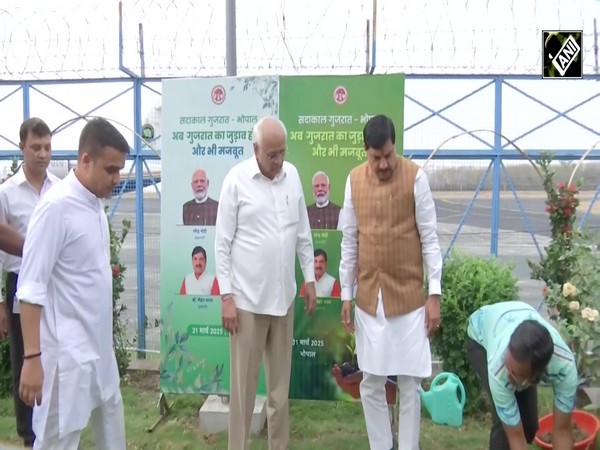India will provide action-oriented solutions as part of G20 presidency: Amitabh Kant
Dec 13, 2022

Mumbai (Maharashtra) [India], December 13 : As India assumed the presidency of G20, Sherpa Amitabh Kant on Tuesday promised that India will provide action-oriented solutions as part of the multilateral forum.
He was speaking at a side event on Data for Development- Role of G20 in Advancing the 2030 Agenda'.
The Observer Research Foundation (ORF), in collaboration with the Ministry of External Affairs (India's G20 Secretariat), the United Nations Conference on Trade and Development and the Office of the UN Secretary-General's Envoy on Technology, hosted an official G20 Development Working Group side event on Data for Development- Role of G20 in Advancing the 2030 Agenda' today.
The event, which took place at the Jio World Centre in Mumbai, featured keynote addresses and interventions by United Nations Secretary-General's Special Advocate for Inclusive Finance for Development Queen Maxima of the Netherlands, Non-Executive Chairman of Infosys and former Chairman, Unique Identification Authority of India (UIDAI) Nandan Nilekani, Union Minister of State for Electronics and Information Technology Rajeev Chandrasekhar and India's G20 Sherpa Amitabh Kant.
It also saw the attendance of special delegates from Bangladesh and the United Arab Emirates (UAE).
It is pertinent to mention, ORF is a leading multidisciplinary think tank with centres in New Delhi, Mumbai and Kolkata and an overseas affiliate in Washington DC.
At the event Amitabh Kant said, "We are meeting at the time of global tumult - with economic recession, the aftermath of the Covid-19 pandemic, crisis of global debt, crisis of global finance."
"India is a bright spot in this gloomy scenario and we will provide action-oriented solutions as part of the G20 presidency," he added.
Abhishek Singh President and CEO of the National e-Governance Division (NeGD), Ministry of Electronics & Information Technology (MeitY), noting the success of the Gatishakti project, said, "Gatishakti is using more than 1600 layers of data for logistics management which has positively impacted manufacturing. G20 has provided us the platform to share our best practices and adopt and replicate models from other countries."
Yoichi Iida, Deputy Director General for G7 and G20 relations, Ministry of Internal Affairs and Communications, Japan said, "G20 can allow the exchange of information for using data and set standards for data exchange."
"We can also learn from each other. India is a real leader in this and we have a lot to learn from it. Perhaps India can establish a framework for shaping standards of data governance," he added.
Shamika Ravi, Vice-President, of Economic Policy, ORF, addressing the need for proper regulations, said, "When institutions become data hungry, we also have to create the necessary infrastructure to harness that data properly."
"As we include the excluded, we must ensure the digital divide can be overcome," noted Anir Chowdhury.
"The G20, as a grouping of developed and developing countries, can help establish a global cooperation framework on data sharing, learning, and amplification," Chowdhury further said.
Several speakers at the event drew attention to the unique advantage that the G20 enjoys as a group that brings together both developed and developing nations. This offers enormous potential for the cross-sharing of knowledge, experiences, innovation and technology.
India has harnessed the power of data to transform the governance of its aspirational districts and other areas such as healthcare, nutrition and food security, women's participation, education, digital payments and digital financial inclusion.
Examples were also shared of some of the extraordinary success stories and ongoing initiatives around 'Data for Development' in other countries such as Bangladesh, Togo, Estonia, the UAE, Japan and the Netherlands.
At the event, the Indian experience with Tech Stack, from Aadhaar to UPI, financial inclusion and vaccination all included consistent and robust stakeholder consultations were discussed.
It was highlighted that it is crucial to have stakeholder consultations and for the government to engage with the private sector and the youth.
They said that the G20 should develop a common understanding of sensitive and non-sensitive data. The Indian Presidency could play an important role in making progress on the classification of data.
It was also mentioned at the event that people, process and finance are necessary to properly harness data--the key to digital public infrastructure. However, these take time and democracies face a special challenge on this as the election season tends to get prioritised. This is where the philanthropy sector can play a role in building digital public infrastructure (DPI).
Amb. Amandeep Gill, Under-Secretary-General, Envoy on Technology said that there is one last aspect to this notion of Data Commons and that is democratising the data and AI opportunity.
"There are nearly 3 billion people who are left out of the digital opportunity, and then within that digital divide, there is a yawning gap that's opening up on artificial intelligence and big data. So, these data commons can help us democratize digital opportunity. And as the SDGs slogan goes--leave no one behind," Gill added.
United Nations and Amb. Nagaraj Naidu, Joint Secretary, G20 said data is the lifeblood of decision-making, as well as the raw material for accountability.
"New sources of data, new technologies and new analytical approaches, if applied responsibly, can enable more agile, efficient and evidence-based decision making and can better measure progress on the sustainable development goals in a way that is more inclusive, just and fair. India's G20 presidency precisely aims at this very outcome," Naidu added.


















